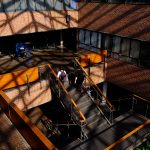CJC Doctoral Student Creates Virtual Reality Simulation for Local Middle School Students
University of Florida College of Journalism and Communications (UFCJC) doctoral student Daniel Pimentel’s virtual reality climate science simulation was featured in “TESI Grant Recipient Brings Middle Schoolers to Antarctica Using Virtual Reality” published on the Florida Museum of Natural History website on July 9.

The 10-minute interactive experience, “Virtual Climate Scientist: A Polar Ice Cap Expedition,” enabled 91 seventh graders at P.K. Yonge Developmental Research School in Gainesville to virtually travel with paleoclimatologists to Antarctica to explore the polar ice cap.
According to Pimentel, “Research shows that immersive storytelling platforms, like virtual reality, can help both students and adults understand social and environmental problems at a more visceral level. This interactive experience allows students to learn how scientists use ice cap information to make predictions of future climate change.”
Pimentel works in the UFCJC Media Effects and Technology Lab and received funding for the project from the UF Thompson Earth Systems Institute. Working in collaboration with scientists and voice actors, he was able to make the simulation as realistic as possible.
“Overall, they enjoyed the experience and felt it actually helped them learn about weather and related subject matter. As many of the students articulated, the ability to actually do instead of simply read was really helpful,” said Pimentel. “By adding the lesson onto the virtual simulation, students learn how scientists are using data to arrive at certain conclusions about climate change and sea-level rise.”
Pimentel says that the results from the experience were promising.
“These results show how much the students identified with the virtual scientists,” he said. “This emphasizes how virtual scientists can have a positive effect on students’ learning experiences, and ultimately serve as realistic influences over how students view themselves. Virtual reality allows the user to assume the perspective of the ‘other,’ and it is through this perspective-taking that users may immerse themselves in scenarios that are otherwise out-of-reach, providing a safe and interactive learning experience.”
Category: College News, Student News
Tagged: Daniel Pimentel Media Effects and Technology Lab
Subscribe to our News Digest


